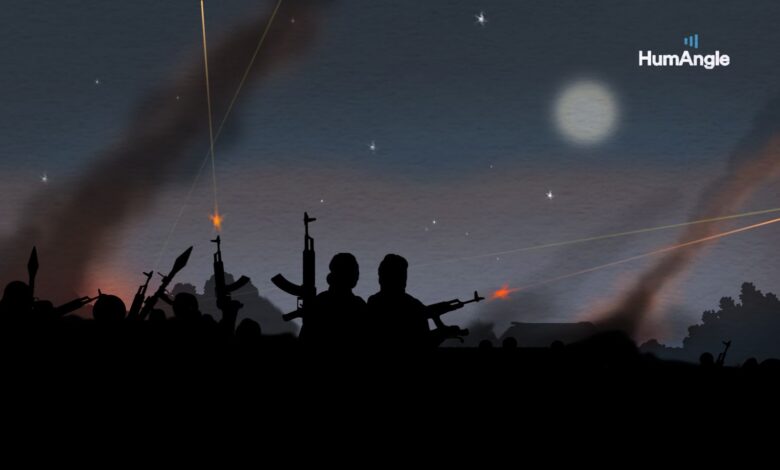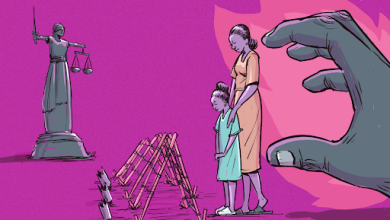Should Nigerians Be Allowed To Bear Arms?
Over the years, there have been calls for citizens to be allowed to bear firearms as insecurity persists, particularly in the northern part of the country. But is this the best solution?

In a passionate presentation on the floor of Nigeria’s House of Representatives, majority leader Alhassan Ado-Doguwa called on the federal government to allow citizens to bear arms for self-defence.
“Nigerians at this moment should be allowed to take arms to defend their innocent souls, to defend their hard-earned resources and properties. Because it’s like a monumental failure,” said the lawmaker, who represents the Doguwa/Tudun Wada Federal Constituency of Kano State.
Ado-Doguwa made this remark on April 1 in reaction to the terrorist attack on the Abuja-Kaduna bound train days earlier, where up to 398 passengers were onboard. Eight persons were reportedly killed, some kidnapped and several others rushed to 44 Nigerian Army Reference Hospital Kaduna, Northwest Nigeria. As of April 5, some were discharged while three remained in the Intensive Care Unit (ICU).
The incident came after terrorists attacked the Kaduna airport in broad daylight and killed one person. Obviously intent on sending a message, again on March 31, terrorists reportedly blocked the Kaduna-Abuja highway.
Ado-Doguwa is not alone
Cafra Caino Boaz, the immediate past chairman of Kajuru LGA on April 4, 2022, supported Ado-Doguwa’s position in an open letter. He pointed out that citizens should “be allowed to bear registered arms to protect themselves since it is evident we are all overwhelmed.”
Titled ‘Pray for Our Leaders’, Boaz called on the Nigerian president to also sign an executive order creating a security agency saddled with the task of ending “banditry.”
He wrote: “There should be locals selected from the most affected communities, trained and armed to face the terrorist head-on. This would serve as a means of employment to youths instead of the hundreds of billions appropriated annually on terrorism without yielding much result.”
The 2022 budget shows that the Ministry of Defence is to spend the sum of N1.52 billion on security operations and another N60.9 million on rehabilitation of the National War Museum in Umuahia, Abia State.
Clamours for self-defence against terrorists have raged on for a while. But how can people do so when they are not legally allowed to carry arms, has always been the question.
In Aug. 2020, Governor Samuel Ortom of Benue State, also called on the federal government to let citizens bear arms to protect themselves against rising insecurity.
“I heard people complaining that Ortom called for Nigerians to be allowed to carry sophisticated weapons and that it would bring about anarchy. What about the herdsmen who are carrying AK-47 and kidnapping innocent Nigerians, raping our women and destroying our villages and towns and becoming a terror to us? How about them? Why can’t we collect these sophisticated weapons from them? How many of them have been arrested?” he asked.
With security not getting any better the following year, Aminu Bello Matsari, governor of Katsina, again harped on the matter when he charged residents in his state to arm themselves against ‘bandits’ and kidnappers. He, like several others, admitted the government’s failure to provide a solution.
An interesting twist to the agitation was the controversial statement by Major General Bashir Magashi (rtd.), the Minister of Defence, who, on the side-line of the screening of Service Chiefs by the House of Representatives, challenged Nigerians to fight back. “We shouldn’t be cowards,” he added, noting that the ‘bandits’ only come with about three rounds of ammunition and people should not run away.
Way back in 2018, Kabir Marafa, a senator representing Zamfara Central Senatorial District, angered by terrorists’ massacre of innocent citizens in his state, emphasised that everybody should own a gun “so that when you are coming to my house, you will know that I have my own gun while you are coming with yours.”
The list goes on.
Responses to Boaz’s open letter by Nigerians within Kaduna State and the Northwest suggest that some are itching to defend themselves while others still have reservations about such an approach to the region’s conflict. But one thing is clear, the numbers of those who view negotiation as an option are terribly low.
It can be recalled that Kajuru, Boaz’s LGA, has been in the news lately mainly as a result of terrorism.
Recipe for ethnic conflict
Yusuf Anka, a Zamfara-based journalist and security analyst, points out that civilians bearing arms in a place like the northwest, which is known for its ethnic diversity, would only increase the spate of violence.
Currently, a local civilian security outfit known as Yan Sakai has been battling it out with terrorists who claim that the vigilantes kill innocent Fulani. This has, to some extent, turned the fight against terror in parts of Zamfara State to a Hausa-Fulani conflict.
States like Benue and Taraba have suffered from the Jukun-Tiv crises as well as the herder-farmer conflict which affects many parts of the country.
“What we need to do is advocate rather than arm people. We have enough arms coming through the borders that are making people unsafe. With the nature of the Nigerian state, where the government is even unable to police the arms within the police and military, I doubt if the Nigerian government has the capacity to monitor arms in the hands of civilians,” Anka says.
“I understand the desire for safety is high and people feel unsafe, especially the elite recently. But it is wrong to allow Nigerians to carry arms.
“The military are doing their best, but what is lacking is the political will at the local and presidential level. The president only seems committed to responsive action. The same thing with the governors and local government chairmen.
“I think the military and other security agencies cannot solve this problem alone. A lot of these problems in Nigeria are, in many places, due to absence of administration or bad administration.”
A case for state police
Ben Okezie, a security analyst, agrees with Anka. He is of the opinion that Nigeria is not ripe to permit its citizens to freely carry arms.
“Because some governors have said it does not mean they are more knowledgeable on security issues,” he stresses, adding that the indices on ground show that Nigeria is not the type of country where you will permit people to carry arms freely, “because in one week the country will become something else.”
Okezie makes reference to a report where Abdulsalam Abubakar, a former head of state, said millions of illegal firearms are “out there,” and so “we can’t think of going into a situation where we will allow people to carry firearms.”
He describes Nigeria’s present insecurity as a situation that can be curbed because it is man-made.
“By the time we finish curbing it, how would we retract or recoup all the firearms we have allowed people to amass? We should not go that way at all or we would be inviting catastrophe in the country.”
A solution to the problem has already been proffered to the federal government, Okezie insists, referring to state policing.
“For instance, in Kaduna State, El-Rufai cannot give orders to the commissioner of police alone. The commissioner would need to hear from the IG.
“But if El-Rufai is in charge, as in the case of state police, he would increase the number of policemen and arm them because he knows he can pay them. There is no way bandits will come from Zamfara to Kaduna and then to Niger State, when all the states are already well-equipped. The governor would not allow it. But the governors are handicapped and not fully in charge of security. There are certain things they would do that the IG or president would overule. In fact, before it starts he would have nipped it in the bud.”
Upset with the security situation in his state, El-Rufai recently said if action was not taken, state governors would hire the services of foreign mercenaries, a statement that met disapproval from different quarters.
Ibrahim Babangida, a former military head of state, is probably one of Nigeria’s oldest advocates of state policing. A highlight of his visit to President Muhammad Buhari in 2018 included a nudge in that area. “We cannot continue to use old methods and expect new results,” he had emphasised.
One fear Nigerians find difficult to shake off, however, is how governors will wield such power after it is given to them.
Support Our Journalism
There are millions of ordinary people affected by conflict in Africa whose stories are missing in the mainstream media. HumAngle is determined to tell those challenging and under-reported stories, hoping that the people impacted by these conflicts will find the safety and security they deserve.
To ensure that we continue to provide public service coverage, we have a small favour to ask you. We want you to be part of our journalistic endeavour by contributing a token to us.
Your donation will further promote a robust, free, and independent media.
Donate HereStay Closer To The Stories That Matter




